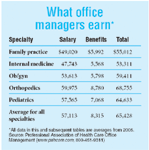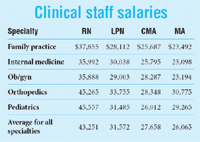Article
Do your staff salaries measure up?
Here are the results of a recent survey on what office managers and clerical and clinical employees earn.
Ever wonder how your staff salaries compare with those at other practices? Are you paying enough to retain good employees or attract new ones? To learn the going rates for clinical and clerical staffers, we looked at the results of the latest staff salary survey conducted by the Professional Association of Health Care Office Management, which drew responses from members around the country, most of them office managers in small-to-medium groups. (About 85 percent work for practices with fewer than seven doctors.)

Only 8 percent of the office managers who responded have employment contracts. But 80 percent receive annual bonuses, either as a percentage of the group's profits, or at the physician's discretion. While 85 percent of the managers get health insurance, only 16 percent said the coverage includes their families.
The average salaries for clinical staffers in all specialties: $43,251 for RNs, $31,572 for LPNs, $27,658 for CMAs, and $26,065 for medical assistants. While RNs generally earn considerably more than LPNs, there was surprisingly little difference between salaries for MAs and CMAs.

Salaries aren't the only thing that's important to keeping good employees, though. Benefits are important, too. About 85 percent of the survey respondents report that their groups provide medical insurance for clinical and clerical employees, although only 16 percent provide coverage for their families. Slightly more than half say their practices provide life insurance; less than half offer disability insurance. About three-quarters say they have a pension plan.
For some perspective on PAHCOM's staff salary data, we talked to Judy Bee, a practice management consultant based in La Jolla, CA. She calls the disparity in salaries between office managers who work for primary care groups vs those employed by subspecialists a "serious mistake." "Their management responsibilities are essentially the same whether they're working in primary care or subspecialty groups," she says, "so the pay should be comparable."





